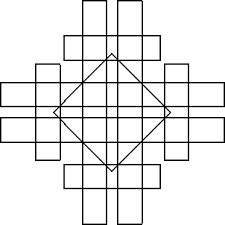Computational Geometry: Young Researchers Forum 2021:
List of Accepted Papers for Computational Geometry: Young Researchers Forum 2021
Booklet of Abstracts
The 37th Symposium on Computational Geometry (SoCG) will be held virtually June 7-11, 2021 (originally scheduled in Buffalo, USA). It brings together the global community of researchers who work on a large variety of aspects that combine geometry, algorithms and applications. To allow a broad audience to actively participate in the community's major scientific event, this year SoCG will again be accompanied by a series of satellite events, which together constitute "CG Week 2021". See https://cse.buffalo.edu/socg21/index.html for details.
One of these satellite events will be the "Computational Geometry: Young Researchers Forum" (CG:YRF), which is aimed at current and recent students. The active involvement by students and recent graduates in research, discussions, and social events has been longstanding tradition in the CG community. Participation in a top-level event such as SoCG can be educating, motivating, and useful for networking, both with other students and with more senior scientists.
The YRF presents young researchers (defined as not having received a formal doctorate before January 1, 2019) an opportunity to present their work (in progress as well as finished results) to the CG community in a friendly, open setting. Just like in the main event, presentations will be given in the form of talks. A pre-screening (but no formal review process) will ensure appropriate quality control.
Due to COVID-19, it has been decided that the entire CG Week 2021 (including YRF) will be online-only. Specific details about the format will be announced later.
Submission guidelines
The idea of the event is for young researchers to present new and ongoing work. Therefore, the work should not have appeared in print in a formally reviewed proceedings volume or journal by the time of submission deadline, and at least one author must be a young researcher.
Topics must fit into the general context of SoCG, as described in the call for SoCG submissions.
Submissions must be formatted in accordance with the LIPIcs proceedings guidelines and not exceed 80 lines, excluding front matter, references. To ensure an accurate line counting, authors must use the LaTeX class file socg-lipics-v2019, which is a wrapper around the standard class (available here). Authors should refrain from putting excessive amounts of texts in parts in which lines are not counted automatically.
Submissions can contain an appendix of arbitrary length to provide further details for the screening process, but the main body of the text should be understandable without reading the appendix. Appendices will also not be contained in the booklet (see below).
The EasyChair submission link is https://easychair.org/conferences/?conf=cgweek2021 .
Accepted abstracts will be compiled in a booklet of abstracts that will be distributed among the participants; this should not be considered a formal publication. In particular, participants are encouraged to submit (an extended version of) their presented work to a conference with formal proceedings and/or to a journal. Booklets of abstracts from previous years' YRF are available here.
The work must be presented at CG:YRF by an author who is a young researcher. Otherwise, it will be removed from the program.
We will employ a two-phase screening process. After the first review phase, there will be a notification of either rejection (if the result is clearly out of scope, or technically incorrect), or conditional acceptance, accompanied with a description of required changes to be made (either with respect to content or format). In the second phase, we will check whether the changes have been implemented satisfactorily. The screening process is intended to ensure the technical quality of the presented work. Submissions that are not well-written risk rejection, irrespective of correctness. Authors are strongly encouraged to have their submissions proofread by their advisor or another experienced scientist.
Important Dates (deadlines are 23:59 Anywhere on Earth)
- • March 14, 2021: Deadline for submissions
- • April 7, 2021: Notification of conditional acceptance
- • April 14, 2021: Deadline for revisions
- • April 24, 2021: Notification of acceptance
- • June 7-11, 2021: CG-Week 2021
Program Committee
- • Mikkel Abrahamsen, University of Copenhagen, Denmark
- • Paz Carmi, Ben-Gurion University of the Negev, Isreal
- • Brittany Terese Fasy, Montana State University, USA
- • Eunjin Oh, Pohang University of Science and Technology, South Korea
- • Marcel Roeloffzen, Eindhoven University of Technology, Netherlands
- • Don Sheehy, North Carolina State University, USA
- • Haitao Wang (Chair), Utah State University, USA
- • Jie Xue, University of California, Santa Barbara, USA
